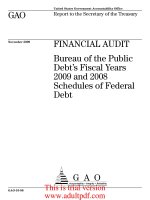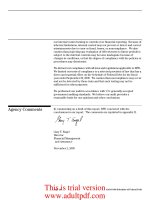United States Government Accountability Office GAO November 2004 Report to the Secretary of the Treasury_part1 pot
Bạn đang xem bản rút gọn của tài liệu. Xem và tải ngay bản đầy đủ của tài liệu tại đây (103.67 KB, 2 trang )
a
GAO
United States Government Accountability Office
Report to the Secretary of the Treasury
November 2004
FINANCIAL AUDIT
Bureau of the Public
Debt’s Fiscal Years
2004 and 2003
Schedules of Federal
Debt
GAO-05-116
This is trial version
www.adultpdf.com
What GAO Found
United States Government Accountability Office
Why GAO Did This Study
Highlight s
Accountability Integrity Reliability
www.gao.gov/cgi-bin/getrpt?GAO-05-116.
For a fuller understanding of GAO’s opinion on
BPD’s fiscal years 2004 and 2003 Schedules of
Federal Debt, readers should refer to the complete
audit report, available by clicking the link above,
which includes information on audit objectives,
scope, and methodology. For more information,
contact Gary T. Engel at (202) 512-3406 or
Highlights of GAO-05-116, a report to the
Secretary of the Treasury.
November 2004
FINANCIAL AUDIT
Bureau of the Public Debt’s Fiscal Years
2004 and 2003 Schedules of Federal Debt
In GAO’s opinion, BPD’s Schedules of Federal Debt for fiscal
y
ears 2004
and 2003 were fairly presented in all material respects and BPD
maintained effective internal control related to the Schedule of Federal
Debt as of September 30, 2004. GAO also found no instances of
noncompliance in fiscal year 2004 with the statutory debt limit.
A
s of September 30, 2004 and 2003, federal debt managed by BPD totaled
about $7,379 billion and $6,783 billion, respectively. At the end of fiscal
year 2004, debt held by the public as a percentage of the U.S. economy is
estimated at 37.5 percent, up from 33.1 percent at the end of fiscal year
2001. Further, certain trust funds (e.g., Social Security) continue to run
surpluses, resulting in increased intragovernmental debt holdings. These
debt holdings are backed by the full faith and credit of the U.S.
government and represent a priority call on future budgetary resources.
Gross federal debt has increased 27 percent between the end of fiscal
years 2001 and 2004. As a result of the increasing federal debt, on
October 14, 2004, Treasury entered into a debt issuance suspension
period to avoid exceeding the current $7,384 billion statutory debt limit
and requested the Congress take action to raise the debt limit by mid-
November 2004.
A
s shown below, total federal debt increased over e
a
ch of the last 4 fiscal
y
ears. Debt held by the public decreased as a result of cash surpluses for
fiscal year 2001, but increased during fiscal years 2002 through 2004, with
the return of annual unified budget deficits. Intragovernmental debt
holdings steadily increased during this 4-year period primarily due to
excess receipts over disbursements in federal trust funds.
$3,439
$
2,220
$3,339
$2,453
$3,553
$2,660
$3,924
$2,859
$4,307
$3,072
2000 2001 2002 2003 2004
As of September
30
Total Gross Federal Debt Outstanding
(in billions)
Held by the Public Intragovernmental Debt Holdings
$5,659 $5,792 $6,213 $6,783
$7,379
Source: BPD.
GAO is required to audit the
consolidated financial statements
of the U.S. government. Due to the
significance of the federal debt
held by the public to the
governmentwide financial
statements, GAO has also been
auditing the Bureau of the Public
Debt’s (BPD) Schedules of Federal
Debt annually. The audit of these
schedules is done to determine
whether, in all material respects,
(1) the schedules prepared are
reliable, (2) BPD management
maintained effective internal
control relevant to the Schedule of
Federal Debt, and (3) BPD
complies with selected provisions
of significant laws related to the
Schedule of Federal Debt.
Federal debt managed by BPD
consists of Treasury securities held
by the public and by certain federal
government accounts, referred to
as intragovernmental debt
holdings. The level of debt held by
the public reflects how much of the
nation’s wealth has been absorbed
by the federal government to
finance prior federal spending in
excess of total federal revenues.
Intragovernmental debt holdings
represent balances of Treasury
securities held by federal
government accounts, primarily
federal trust funds such as Social
Security, that typically have an
obligation to invest their excess
annual receipts over disbursements
in federal securities.
This is trial version
www.adultpdf.com









